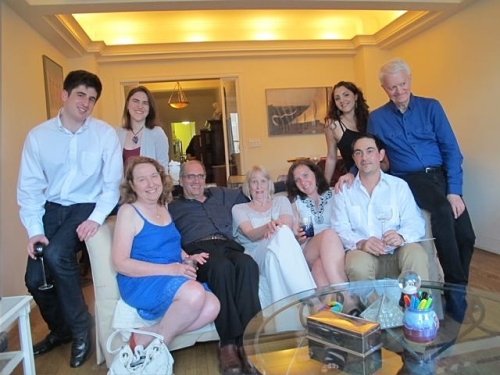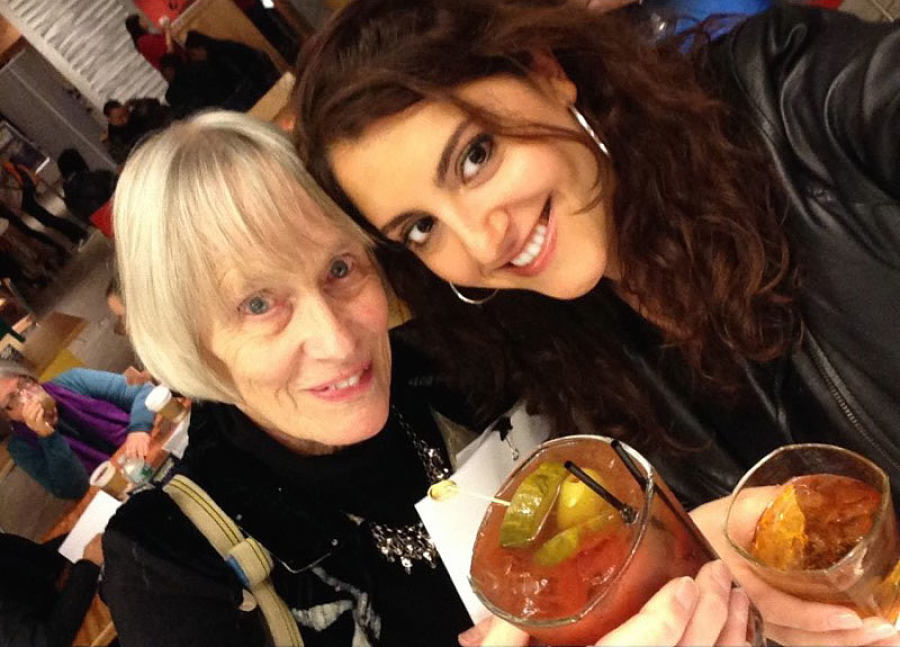When Tina Howe invites you to her home for lunch and Bloody Marys you go, even if she is also making you an online dating profile.
Last spring, just as my professional life was coming together as I graduated with my playwriting MFA from Hunter College, in the program Tina founded, my personal life was falling apart. A nearly 10-year relationship with the man I thought I was going to spend my life with came to a crashing end, and as anyone who has had to endure a breakup with a live-in partner in New York City can attest to, the breakup is hard—but the hunt for a new apartment will nearly kill you.
Once the literal and figurative dust settled and I was in my new apartment uptown, Tina called and told me it was time. In her dining room she served myself and her beloved husband, Norman, a delicious lunch of roast chicken, the best potato chips you’ve ever had, and a perfect Bloody Mary. Then we went on the computer, where she spent the next hour-and-a-half making me a dating profile. In my “About Me” section, she wrote that I was a “true celebrant,” citing my love for cheese, bread, alcohol and lounging on beaches. Hoping I would appeal to a wide range of men across ethno-religious backgrounds, she described me as Italian Catholic, but added, “As Lenny Bruce says, ‘All Italians are basically Jews.’” That reference also inadvertently broadened my generational range as well.
I would spend more weekends at her home as she vetted my potential mates and coached me on how to respond to various communications. The experience of having Tina as my personal dating coach was something between glorious and absurd—not unlike Tina’s plays. She once suggested that I entice one suitor by telling him I was dressing up as a sieve for Halloween. Out of Tina’s mouth, that kind of flirtation made perfect sense, though I’m not sure that the effect was quite the same when it came from me.
Anyone who has had the great pleasure to know Tina personally knows that in addition to being a national treasure and playwriting luminary, she has an enormously kind soul. Tina has no doubt touched countless lives, but perhaps most especially the lucky few who can call her teacher. Now, after 25 years at the job, Tina Howe is retiring from Hunter College. She began at Hunter in 1990, and in 2010 launched what is perhaps the least classist MFA in playwriting in the country, charging for a year what most institutions charge for a course and specifically appealing to writers who have to work full-time. In the end, a total of 19 students have had the immense privilege to call Tina their MFA advisor, and I was lucky enough to be among the last class to graduate with her.
As her involvement in my dating life indicates, Tina has been to her students so much more than an artistic guide; she has been a life guide. Not only does she make supporting the student’s artistic impulses her primary focus, she makes every moment of her tutelage special. She’ll invite you to the Armory to sway on 100-foot swing sets or give you a book cut into the shape of your initial with a poem on the title page about all the unique things you bring to the theatre and the world.
When I was one week out from rehearsals for my thesis production of a play called Pump, with a draft it would be generous to describe as a mess, she coached me through a Page One rewrite. Every day I wrote 10 new pages, and every morning she’d call with notes. I was the racehorse and she was the jockey, except it felt more like being patted on the head with a magic wand than slapped on the ass with a whip. And that’s what makes Tina Howe perhaps the greatest teacher a writer finding her voice could ask for. Many a student of Tina’s has spent a Sunday afternoon in her sun-drenched apartment, sipping tea and working out problems in their play, and their life. Her home is a sanctuary to a beleaguered artist and her friendship an unwavering guarantee in a field in which so few things can be relied upon.
She has been a pioneering trailblazer for female playwrights, writing such masterpieces as Museum, The Art of Dining, Painting Churches, Coastal Disturbances, Pride’s Crossing and more. She has won an Obie, a New York Drama Critics Circle Award, been a Pulitzer Prize finalist (twice) and been nominated for a Tony. And still, with all of this, she has given so generously of herself as both a teacher and mentor.

This winter she gathered a group of her current and former students to see Charles Mee’s Big Love at Signature Theatre, and afterward at the West Bank Café, told us she was retiring. I felt sad for the students who would never get an opportunity to study with this living legend—someone you can not only reach out and touch, but who will grab you with both arms and pull you in for a hug so sincere that you know for sure you are loved.
I mourned this loss until I realized that when one is lucky enough to have a teacher, a mentor, a guide, one never stops learning from them. Teaching doesn’t just happen while seated at a desk. It happens everywhere, led by her example in continuing to write great plays, and exemplifying kindness and humility at every turn, always being there with a cup of tea or Bloody Mary for students or friends in need of a Sunday afternoon at her dining room table.
Some weeks ago I was finally able to introduce Tina to the fruits of her dating-profile labor on a double date with her husband. The four of us drank whiskies, shared cheeseburgers, and had so much fun we’ll do it again next week. On behalf of all her students in the classroom and beyond: Thank you, Tina, for all the lessons on how to write, but even moreso on how to live.


